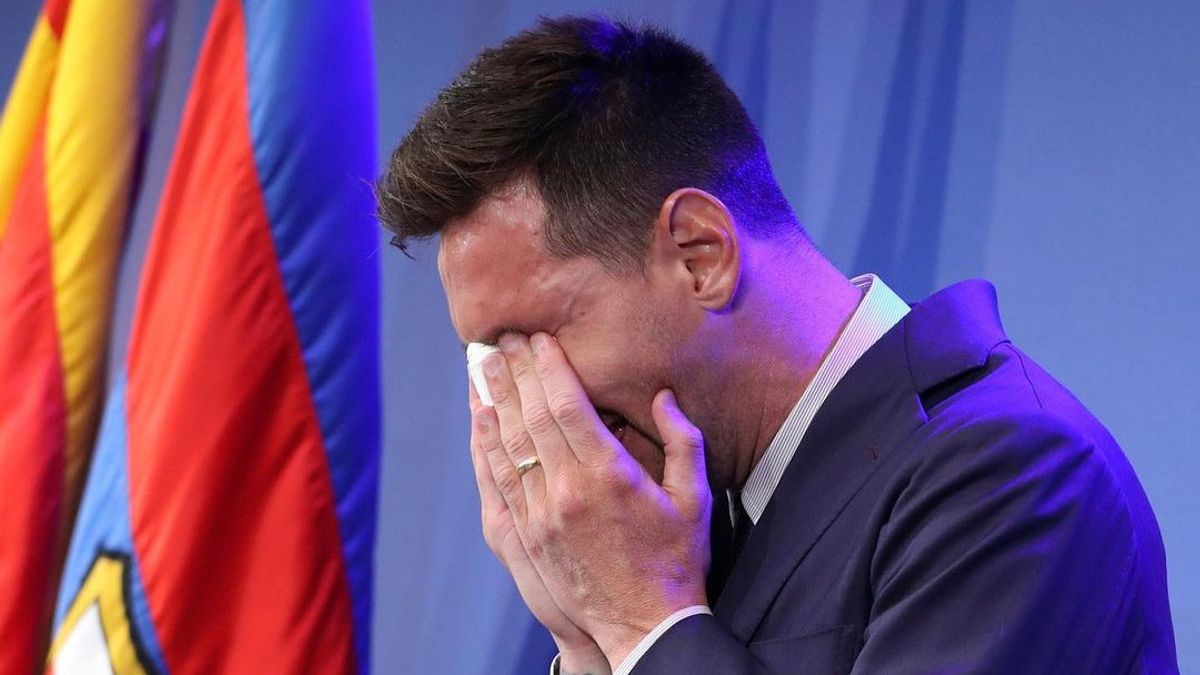JAKARTA - Lionel Messi burst into tears when he even just started his farewell press conference with Barcelona. Beyond all aspects of nostalgia, Messi's tears highlight aspects of patriarchal culture that we should start to normalize crying for men.
"He cries easily in the cinema," Nicole Barber (Scarlett Johansson) explains why she loves Charlie Barber (Adam Driver) in the opening scene of Marriage Story (2019). At first glance but quite clear: Charlie Barber is a man with emotional openness.
The opening part of the film is an important line to summarize the nature and persona of the characters and the conflicts that are built. The director, Noah Baumbach even called the opening scene the most difficult in the preparation of the screenplay. It takes balance, he said.
"This has to be an overall picture of the characters Charlie and Nicole and the family they live in. My team and I have to provide visuals that support Nicole's narrative about Charlie and how Charlie portrays Nicole," Baumbach said on his YouTube account, Netflix Film Club.
In other words, this little scene about Charlie's emotional openness is not just a patch, but a cornerstone of the entire film. Even that attitude influenced Charlie in his decision to prefer to keep his marriage.
In the second mediation, Nicole considers the mediation useless because she has been firm with the desire to divorce. Meanwhile, Charlie doesn't really know the concrete reasons that make Nicole want a divorce. But that's what this film builds on.
Yes, we can see the conflict awakened through Nicole's emotional openness, something that even Nicole actually reveals is still in a series of key opening scenes. "He (Charlie) is very clear about what he wants. Unlike me, who always can't say."
There are two things we can catch from Charlie, Nicole, and the opening scene in Marriage Story. The first is that there is no particular type of emotion that is a gender monopoly. The second is of course about the importance of expressing emotions. And Messi is the momentum to see this phenomenon again.
Crying in sports is more tolerated
The world is able to understand Messi's cry as a universal emotion. Of course many things. Apart from the nostalgia aspect, in fact, men tend to cry more easily in a competitive sport.
A study was conducted by Heather J. MacArthur, a psychologist from Hamilton College, New York, United States (US). The study investigated the possibility that male crying is more common and more tolerated in the context of competitive sports.
The study, which was released on the Frontiersin.org website, tested two hypotheses. First, how respondents perceive masculine stereotypes to be disturbed by crying and that crying is very closely related to feminine stereotypes. The result is confirmed.
Respondents saw crying attached to feminine stereotypes. But different results were obtained when the researchers linked the context of men's crying in a competitive sport. Crying in a sports context tends to be more tolerable by masculine stereotypes.
"Showing that male participants were reported to be more likely to shed tears after losing a weightlifting competition than figure skating," read the results of the study.
"Overall these findings suggest that men who are perceived as embodying cultural ideals of masculinity -- represented by the sport of weightlifting -- can be given more room to cry than those who are perceived to be less stereotypically masculine."
'Boys don't cry'If the world can tolerate Messi's cries, what about the cries of men other than Messi? We are familiar with the term "Boys Don't Cry" which describes the strong emotions of men. Without fragility.
The American Psychological Association (APA) describes this phenomenon as destructive. In a campaign video entitled Boys Don't Cry, APA addresses the parenting style of many parents in the world who tend to keep boys away from emotional touch.
In the video, a number of psychologists speak out against the stereotype. The founder of The Love More Movement, Bruce Purnell, says restraining one's expression of emotions can lead to a number of problems, such as a desire to compete, the ability to thrive, and balance to develop positive relationships.
"That's because we don't have the emotion we need," Purnell says.
Another psychologist, Andrew Smiller, rejects the emotional monopoly on gender. Emotions are a basic human device. One of the many things that distinguish humans from animals. Including crying, which according to him is a fundamental instinct.
Humans experience it from birth into the world. Crying is even seen as a form of basic human communication in relation to parents. Crying is a universal language that builds the bond between a baby and a parent. The more the emotional construction is awakened, the crying changes.
It is a response to emotional outbursts, such as sadness, loss, frustration, and happiness. In a negative context, holding back tears can lead to emotional and even traumatic disorders that burden the psyche.
"Poetry writers and philosophers have cited emotions, including crying, as the boundary that separates humans from animals," says Smiller.
Professor of psychology from Clark University, Addis highlights traditional gender constructs in the framing of male cries. According to him, the patriarchal perspective that burdens men as 'anti-breakdown' figures must be ended. The world must build a new form of masculinity that is kind and respectful of other people's choices of expression.
"Now the next challenge is to increase our understanding and awareness of how psychologically crying for men is not something strange, but on the contrary it is natural for them to do," he was quoted as saying by Psychology Today.
After all, expressing emotions, including crying, has a number of benefits. Crying, of which is useful for reducing stress. Crying stimulates the production of endorphins in the body which can reduce pain and make us feel better.
Crying can also improve mood because manganese levels in our body will come out with tears. Another benefit of crying is that it relieves feelings and kills bacteria. According to research, the content of lysozyme in tears can kill 90 to 95 percent of bacteria around the eyes.
*Read other information about MESSI or read other interesting articles from Yudhistira Mahabharata.
Other BERNASThe English, Chinese, Japanese, Arabic, and French versions are automatically generated by the AI. So there may still be inaccuracies in translating, please always see Indonesian as our main language. (system supported by DigitalSiber.id)












